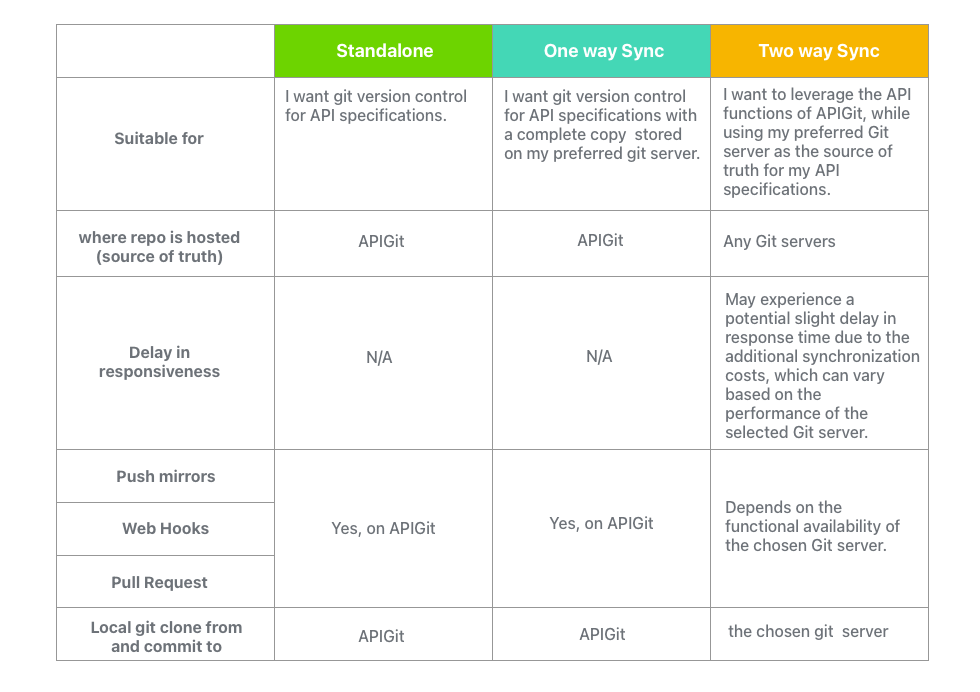APIGit is a cutting-edge collaboration platform that leverages the power of Git technology to make API development and collaboration seamless. With its flexible options, it offers a wide range of customization to fit your specific needs.
- standalone
In standalone mode, API repositories are hosted solely on APIGit and treated as the single source of truth. All commits made through the web portal or local Git clients are automatically directed to APIGit's global, highly-available servers. This option offers the simplest setup, with all the data and history stored within the APIGit platform.

- standalone + one-way synchronization
Standalone with one-way synchronization takes things a step further by allowing you to configure multiple "push mirrors" to sync your API repositories with external Git servers of your choice. This way, you can keep a copy of your repositories on APIGit as the authoritative source, while also keeping them updated on popular Git platforms like Github, Bitbucket, Azure DevOps, AWS CodeCommit, Gitee, or even your own self-hosted Git server with public access.

- two-way synchronization
For those who already have their API repositories hosted on an external Git server, APIGit offers a two-way synchronization option. This allows you to keep your API repositories on your designated external server as the single source of truth, while APIGit provides a smart two-way synchronization to ensure that all commits made on APIGit are automatically reflected on the external server and vice versa. This option offers the most control and integration with your existing Git infrastructure.

In conclusion, APIGit provides you with the flexibility and choice to determine the best option for your business needs. Whether you need a standalone solution, one-way synchronization, or two-way synchronization, APIGit has got you covered with its comprehensive set of features and options. The most suitable mode for you will depend on your unique requirements and working process. To assist you in making an informed decision, here's a comparison of the three modes.

Related Posts
API Repository
APIs have become a vital part of modern software and business infrastructure, enabling organizations to expand the capabilities of software and improve integration with external services. The process of API development involves several stages, including planning, designing, developing, testing, deploying, and maintaining APIs. The API producer is responsible for creating and managing the API, while the API consumer utilizes the API to build applications or integrate with existing software. Apigit's API Platform is designed to help organizations navigate the API development and management process more effectively, with native Git support and streamlined collaboration. By leveraging Apigit's capabilities, businesses can improve operational efficiency, integration with external services, and stay competitive in the rapidly evolving digital landscape.
apigit custom webhooks
A webhook is a way for an application to provide real-time information to another application or service by sending HTTP requests when a specific event or trigger occurs. It allows applications to communicate and share data with each other automatically.
upstream push mirrors
Push mirrors are often used in distributed development environments where multiple teams or individuals work on the same codebase across different locations. They allow for redundancy, collaboration, and backup purposes. By using push mirrors, everyone can work on their local repositories and push their changes to a central mirror repository, ensuring that the changes are distributed to other team members or locations.
Ready to get started with APIGIT?
Join thousands of developers and teams who are already using APIGIT to streamline their API development workflow.